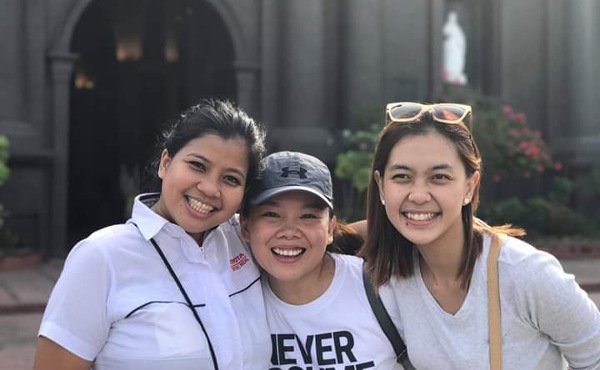"It's a difficult time for everyone. For many, very difficult," the Roman Pontiff reminded us before making a specific request: "Let us try, if we can, to make the best use of this time: let us be generous. Let us help those in need in our neighborhood." And he added: "Even if we are isolated, thoughtfulness can go far with the creativity of love. This is what is needed today: the creativity of love."
From the Philippines to Argentina and Poland, the following stories are just a sample of where creativity at the service of charity can lead us in our current adverse circumstances.
Philippines: Project #ProtectMe
Everyone needs an angel. Who doesn't need a guide, a helping hand, someone to share their joys and sorrows? This is what "Angels Today" is all about—an initiative begun by a former resident of Tahilan (an Opus Dei residence in Manila, Philippines), Kaye, and her family. In 2017, they launched what Kaye calls "projects driven by love and initiatives centered on collaboration."
In response to Covid-19, "Angels Today" launched the #ProtectMe campaign. Kaye says: "I was chatting online with two former Tahilan residents, Lauriz and Cel. We talked about how each of us was doing in the quarantine and realized that all three of us had a great desire to help, especially since we all have family and friends in the medical field. We wondered what we could do, what items were needed, and in which hospitals. That was the start of the project.”
The results were immediate: "We started by purchasing N95 masks that we financed with our own budget (my mother was a great help in this regard) and launched a search for donors, funds and suppliers. To date, we have received numerous donations from individuals, thanks to which we have been able to deliver 3,260 face masks and 200 eye shields to seven hospitals in the Philippines, after finding reliable and reasonable suppliers."

"The passion of my mother for this work and the formation I received at Tahilan Residence have been vital influences in making 'Angels Today' what it is now," says Kaye. "We are trying to encourage other family members to help out, to ensure that staff in hospitals with limited or no stock get protective equipment.” Although the project was born with a very personal motivation, "since there are very dear people in our family and among our friends working on the front line, and we wanted to protect them," over time they have been able to extend the aid they give and now reach a large number of people who risk their health and their lives to help the sick.
"I'm not surprised by the fact that, in every call to action we've made, the first to respond have been people without great resources."
"Thanks to this activity, I have come to a greater appreciation of my friendship with other former Tahilan residents, despite our very different personalities," says Kaye. "My personal opinion is that this crisis is bringing out the best in people. At the end of the day, we all feel moved to help and care for each other, in one way or another. I'm not surprised by the fact that, in every call to action we've made, the first to respond have been people without great resources, who we might call middle class. It's been that way since we started. They have the biggest hearts, considering that they need the money for their own families. They give what they can, from 200 to 5,000 Philippine pesos, and they show us that no amount is too big or too small for a heart that cares and loves.”
Poland: My Elderly Neighbours
In many European cities there are elderly people living alone in apartment blocks. Although their families cannot visit during the quarantine, they are supported through acts of solidarity from young neighbors. Among other services, these young people are helping by going to the supermarket to shop on behalf of their neighbors. This is what Basia, who lives in Warsaw and works as a freelance journalist at the John Paul II Thinking Centre, does.

Basia, who is 35 years old and a member of Opus Dei, tells us: "When the epidemic began, I asked myself what I could do for the elderly, who are particularly vulnerable. The first thing I did was to call some old women I know who live alone, whom I have visited on various occasions with my friends, to ask them if they needed help.
"Then I looked on the internet and found some posters that were titled, 'Neighborhood Help: Buy Things for the Elderly.' They were ready to be printed and posted in the hallway of the building or on the stairs. At that point, I ran out of ink for the printer, so I decided to make them manually. It took me a while to hang them up because I didn't know how the neighbors would react, but I finally managed to overcome my shyness.
"So far, I haven't received many calls to go to the supermarket, but I have had the odd request, like an elderly man who asked me to help him cut his bangs."
"In the evening on that same day, someone rang my apartment’s doorbell. It wasn't an elderly person but another neighbor who wanted to add her phone number to the ad. She wanted to join as an assistant to help with the shopping.
"So far, I haven't received many calls to go to the supermarket, but I have had the odd request, like an elderly man who asked me to help him cut his bangs, even though I hadn't offered hairdressing services.
"I also posted on Facebook and had many positive responses. Another neighbour told me that he wanted to join in to help, and later one of my friends told me on the phone that when she saw my Facebook post, she decided to call her older neighbors and ask them if they needed anything."
Argentina: Designing Face Masks and Medical Gowns
"My name is Rita. I am 79 years old. I am a clothing designer and I taught in fashion institutes until last year. I also gave classes as a volunteer in poor neighborhoods. When the coronavirus quarantine began, I thought about how I could help and started making a good number of facemasks, using materials I had at home and then distributing them to different institutions.

"At the request of a neighbour who is a doctor, I started making medical gowns from materials we collected. From there an incredible initiative was born. I contacted a former student who has a teaching institute and we bought some materials and started making gowns, working nonstop. In a few days it had grown; today there are more than 30 of us collaborating in different areas of the city of Rosario, Argentina. Each person has a specific job and it is impressive to see how everyone collaborates: some with monetary donations and others, manufacturers, cut our robes in their workshop, all for free. Because the initiative grew so quickly, we decided to ask friends and acquaintances for money to help us continue. Donations began to multiply.
"My husband and children also help me in this task. What a joy it is to see that there are so many good people who want to collaborate! This exceeds my expectations, since they not only deposit money, but also send us notes of congratulations and gratitude."
